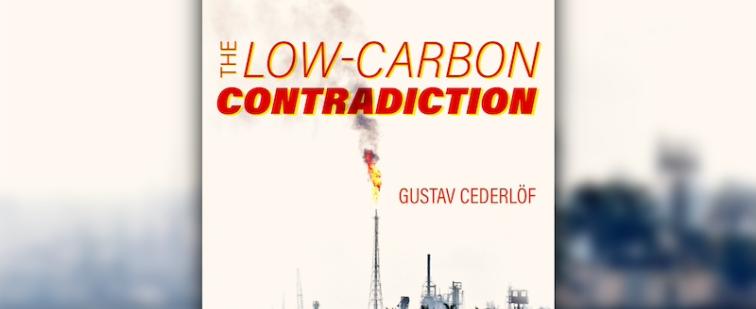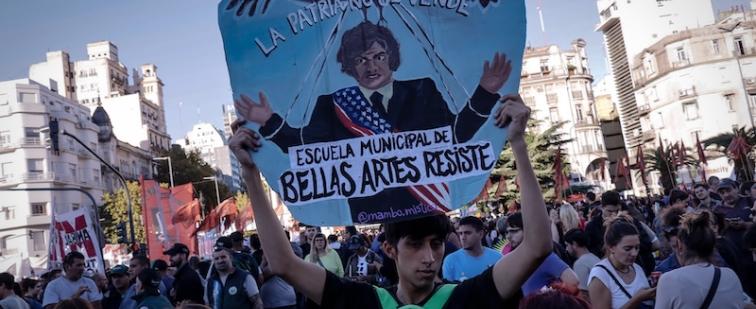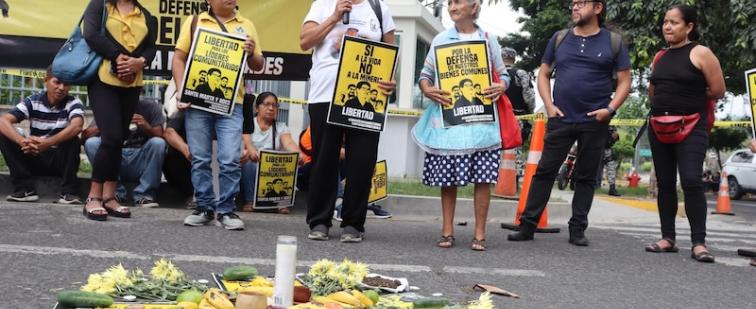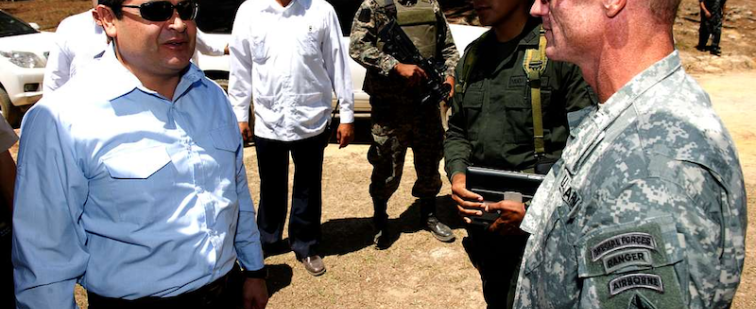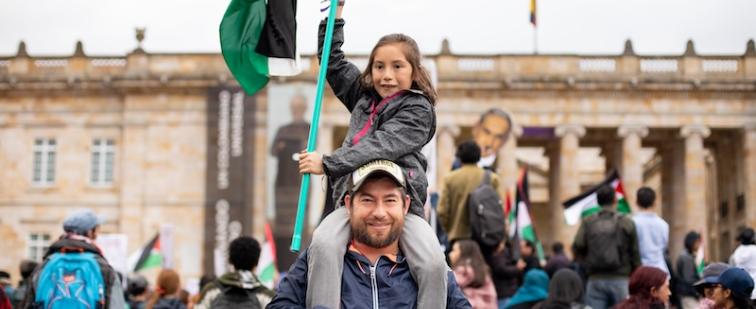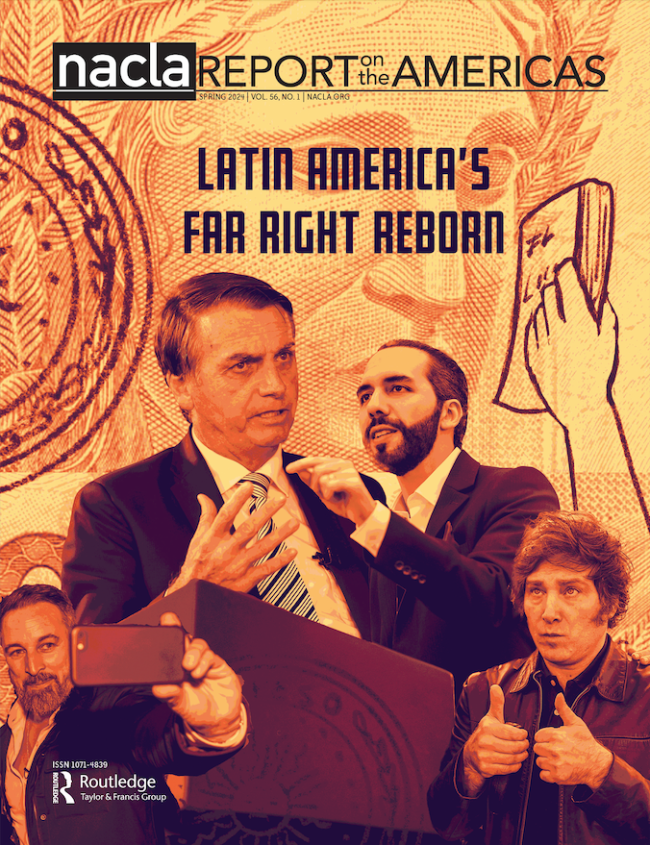Home
The Peruvian economy has been enjoying something of a heyday lately, basking in the glow of the mainstream media. Currently being hailed as something of a Latin American wonder child, the Andean country has received increasing press coverage for its near decade of strong growth, which has continued despite the global economic downturn. But extensive coverage of fawning comments by President Obama have overshadowed the parallel narrative of a country potentially on the brink of disaster, with widespread voter discontent, sharp income disparity, and explosively divergent claims to land and resources.
Peruvian leader Mario Palacios speaks to NACLA about organizing to counter the impacts of the increasing presence of extractive industries in Peru. He says: "Our ancestral communities, many of which have territorial titles that date back 300 or 400 years to the colonial period, are today suffering from the expropriation, dispossession, and dissolution of their territories, not only because of the actions of the mining companies, but also because of the state itself and the governmental policies that are being applied in Peru."
This interview originally appeared in the September/October 2010 edition of NACLA Report on the Americas.
Recent massive protests in Potosí, a traditional bastion of support for Bolivia’s Movement Towards Socialism (MAS) government, have confronted President Evo Morales with perhaps the most significant challenge of his second term in office. Unlike past regional revolts led by conservative opposition forces in Santa Cruz, Potosí represents a new type of regional economic conflict led by coalitions of popular organizations demanding to be part of Bolivia’s “process of change.” These protests are taking place in the context of a new federalism that is raising expectations as well as demands for political accountability.
Indigenous peoples across Latin America have taken a leading position in defending national sovereignty, democratic rights, and the environment. A renewed cycle of capitalist accumulation in the region centered on mining, hydrocarbon extraction, and agro-industrial monocultures has sparked the new round of indigenous resistance. Drawing on organizational and political legacies of previous decades, indigenous groups in the 1980s and 1990s grew and gained strength from an international arena in which governments were encouraged to recognize and promote cultural and minority rights. In this issue of the NACLA Report, we explore the contributions and creative possibilities of indigenous movements at a moment when indigenous politics has moved beyond this request for state recognition and inclusion.
The “rural city” of Nuevo Juan de Grijalva is part of a government project which claims that it will reduce poverty in the Mexican state of Chiapas by relocating impoverished rural communities into centralized cities built by the state government. However following an orthodox free market economic model promoted by the Mexican state under the Plan Puebla Panama, the Sustainable Rural Cities Project imposes a monoculture, agro-export model that undercuts the subsistence farming practiced by most of its residents. As farmers can no longer cultivate their land, unemployment has risen, and the costs of basic services have quadrupled since its 2008 inception, there has been a significant and building local resistance to the project.
Ramiro Choc, a Q’eqchi’ community leader, has been fighting for indigenous people’s land rights in Guatemala’s volatile departments of Alta Verapaz and Izabal since the 1990s. These are the so-called "crimes" that led to his six year prison sentence starting in 2008. His story illustrates both the tension and boisterous mobilization of the people around land and natural resource issues in this area of Guatemala. To this mobilization, the Guatemalan government is responding by criminalizing peasant leaders, militarizing regions slated for development projects, and using environmental “protected areas” to exclude indigenous people. This combination of ingredients has become the core of Guatemala’s new civil conflict.
While the presidential candidacy of rapper/entertainer Wyclef Jean in Haiti’s upcoming elections has garnered much international attention, underneath the glare of this hype are the continued assaults on the country’s democratic process. Much is at stake in this key election, scheduled for November 28. The winner will be responsible for the colossal task of rebuilding the nation’s shattered infrastructure and psyche after the January 12 earthquake. Jean’s glitz and glamour may have stolen international headlines (despite Haiti’s August 20 ruling denying him the candidacy), however, the real story is that the country’s strongest and most popular political force will again be excluded from these elections.
The August 1 deployment of 1200 National Guard troops to the U.S.-Mexican border further ignites skepticism about the Obama administration's stated claim that there would be a shift away from militarization in the U.S. anti-narcotic strategy. While in March Washington stressed that new strategies were needed to fight drug trafficking, which would include expanding our border focus beyond interdiction of contraband to include "building stronger communities," troops are lining up on the U.S.-Mexican border once again, and U.S. aid under the Merida Initiative continues to flow to Mexico for seemingly the same-old militarized approach.
Following the hype of being deemed as one of the world's "fastest growing and most important energy development stories," Colombia put 168 oil and gas concession blocks on auction in June to foreign and national exploration and production companies. The Canadian energy corporations that led the charge to gobble up these concessions now stand to have preferential treatment in Colombia. The Canada-Colombia Free Trade Agreement, signed into law in Canada in June, now only awaits Colombia finalization to go into effect.
On July 29, a federal judge issued a partial injunction stopping four of the most egregious provisions of Arizona's controversial new immigration law, SB-1070. However, that same day Arizona sheriff Joe Arpaio quickly responded by saying "It doesn't matter what the ruling is by the federal judge," and along with a 200-strong posse swept into an immigrant community with the intent of arresting undocumented people. But while Arpaio’s customary bravado underscores the vigilante attitude running rampant in Arizona, what he doesn’t say is that he’s authorized to do his immigration sweeps not under Arizona state legislation, but federal law.




